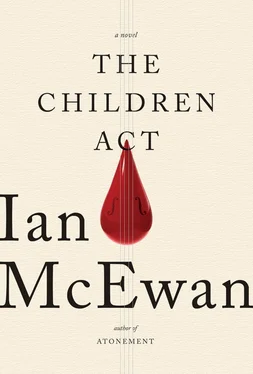SHE FOUND HER coat and, careless of the fresh downpour, walked to the flat as quickly as she dared in high heels. In the sitting room, a couple of candles were as they had carelessly left them. Still in her coat, hair flattened to her scalp, water dribbling down her neck to the small of her back, she stood still, trying to remember a woman’s name. So much had happened since she last thought of her. She recalled a face, she heard a voice, then it came back. Marina Greene. Fiona took her phone from her handbag and called. She apologized for calling out of hours. They spoke briefly, for there were screaming infants in the background and the young woman sounded tired and harassed. Yes, she could confirm it. Four weeks ago. She gave the few details she knew and said she was surprised that the judge had not been informed.
Fiona remained standing in the same place, her gaze settled, for no particular reason, on the plate of food her husband had prepared, her mind a merciful blank. The music she had just played didn’t resonate in her mind, the way it usually did. She had forgotten the concert. If it was neurologically possible not to think, she had no thoughts. Minutes passed. Impossible to know how many. At a sound, she turned. The fire was in its last throes and collapsing into the grate. She went over to it, knelt down and set about building it up, lifting fragments of wood and coal, with her fingers rather than the tongs, and placing them on and near the remains of the glowing heat. After three strokes of the bellows, a splinter of pine caught fire, which spread to two larger pieces as she watched. She moved closer and let the spectacle of tiny flames, their sideways bobbing and swiping movements across the surrounding blackness of coal, fill her vision.
At last, thoughts came in the form of two insistent questions. Why didn’t you tell me? Why didn’t you ask for my help? The answer came back in her own imagined voice. I did . She rose, aware of a pain in her hip as she went to her bedroom to retrieve the poem from the bedside table, where it had lain for six weeks. Its melodramatic tone, the puritanical suggestion that a bid for freedom, throwing the heavy cross in the river, receiving one chaste kiss, should be satanically inspired had deterred her from reading it again. There was something dank or suffocating about the Christian paraphernalia—the cross, the Judas tree, the trumpets. And she was the painted lady, the fish with rainbows on its scales, the treacherous creature that led the poet astray and kissed him. Yes, that kiss. It was her guilt that had kept her away.
She crouched down by the fire again and set the poem before her on the Bokhara rug. Her coal-dust fingerprints smudged the top of the page. She went directly to the final verse—Jesus standing miraculously on the waters of the river, announcing that the fish was Satan in disguise and the poet “must pay the fee.”
Her kiss was the kiss of Judas, her kiss betrayed my name.
May he
She reached for her glasses on the table behind her and leaned closer in to follow the crossed-out and encircled words. “Knife” was deleted; so were “pay,” “Let him” and “blame.” The word “himself” was deleted, reinstated, deleted again. “Mustn’t” was replaced by “must,” and “sinks” by “drowns.” “May” was by itself, without a balloon, floating above the fray, with an arrow indicating it should replace “And.” She was getting the hang of his methods and his handwriting. And then she had it, she saw it plainly. There was even a meandering connecting line running between the chosen words. The Son of God had delivered a curse.
May he who drowns my cross by his own hand be slain.
When she heard the front door open, she didn’t turn away, and this was how Jack glimpsed her as he passed by the sitting room on his way to the kitchen. He assumed she was tending the fire.
“Build it right up,” he called. And then, from further away, “You were brilliant! Everyone loved it. And so moving!”
When he came back with the champagne and two fresh glasses, she had stood to take off her coat and fling it over the back of a chair and remove her shoes. She was standing still in the center of the room, waiting. He didn’t notice her pallor as he gave her one of the glasses and she held it out to be filled.
“Your hair. Shall I get you a towel?”
“It’ll dry.”
He removed the metal stopper and filled her glass, then his own, which he set down while he went over to the fire and emptied the coal scuttle over it and put on three large logs, wigwam style. He turned on the hi-fi and started the Jarrett again.
She murmured, “Jack, not now.”
“Of course. After tonight! Stupid of me.”
She saw that his wish was to get back quickly to where they were before the concert, and she felt sorry for him. He was doing his best. Soon he would want to kiss her. He came back to her, and in the silence, which had hissed in her ears the instant the hi-fi was off, they touched glasses and drank. Then he talked about her and Mark’s performance, of his, Jack’s, tears of pride when they all stood at the end, and what people were saying afterward.
“It went well,” she said. “I’m so glad it went well.”
He was not a musician, his taste was strictly for jazz and blues, but he spoke plausibly enough about the concert and remembered the pieces separately. Les nuits d’été was a revelation. He was especially moved by the “Lament,” he even understood the French. The Mahler he would need to hear again, for he sensed an enormous reservoir of feeling in it but he couldn’t quite connect first time around. He was glad that Mark sang it in English. Everyone knew the urge to run from the world; few dared do it. She listened gravely, or appeared to, and gave short responses and nods. She felt like a hospital patient who longs for her kindly visitor to leave so she can resume being ill. The fire took, and Jack, noticing that she was shivering, guided her toward it, and there he poured the rest of the champagne.
They had lived in the square a long time, and he knew the Gray’s Inn benchers almost as well as she did. He began to tell her about the people he had run into that evening. The square was tightly knit; the people in it fascinated them. The late-evening postmortem was a feature of their lives together. It was easy for her to continue mumbling an occasional response. Jack remained in an elevated state, excited by her performance, and by what he thought lay ahead. He told her about a criminal lawyer who was setting up a free school with others. They needed a Latin translation for their motto, “Every child a genius.” Three words maximum, short enough to be sewn onto a school blazer, under a heraldic phoenix rising from the ashes. It was a fascinating problem. Genius was an eighteenth-century concept, and Latin renderings of “child” were mostly gender-specific. Jack had come up with “ Quiusque parvuli ingenium ”—not quite as strong as genius, but natural wit or ability would do nicely. At a pinch “ parvuli ” could encompass girls. Then the lawyer had asked him if he’d be interested in creating a lively Latin course for eleven- to sixteen-year-olds of mixed abilities. Challenging. Irresistible.
She listened without expression. No child of hers would ever wear such a wonderful badge. She was excessively vulnerable, she realized.
She said, “That would be a good thing to do.”
He caught the flatness of her tone and looked at her differently.
“Something’s up.”
“I’m all right.”
Then, frowning as he recalled the question he had failed to ask, he said, “Why did you walk off at the end?”
She hesitated. “It was too much for me.”
Читать дальше












